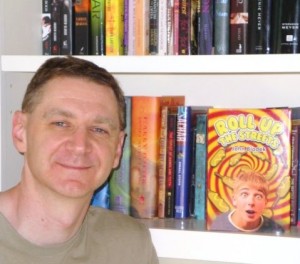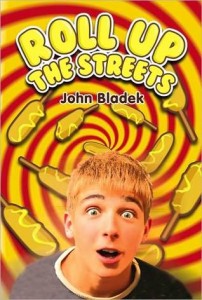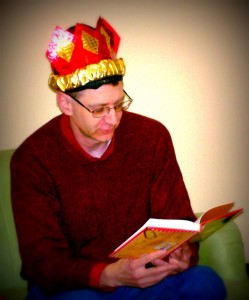 Debut middle grade author John Bladek has devoted most of his life to pondering the eternal question, “What stinks?” However, constantly holding his nose prevented him from growing up.
Debut middle grade author John Bladek has devoted most of his life to pondering the eternal question, “What stinks?” However, constantly holding his nose prevented him from growing up.
Despite the nose pinching he managed to earn a PhD in History so he could put Dr. in front of his name and pretend to be an adult. But he discovered that writing for kids about wicked smells and evil fast food was much more fun.
In addition to volunteering for SCBWI, John also leads Talespinner’s, a critique group for children’s authors, in Spokane, Washington.
I had the chance to interview John over the weekend and I have to say, the laughs never ended. And his new novel Roll Up the Streets (Kane/Miller) lives up to its humorous promise and is the perfect read for a reluctant tween boy reader.
Hello, John. Can you give us a quick synopsis of Roll Up the Streets?
 (J.B) It’s about a 12-year-old smart aleck named Jake who gets stuck in a rotten little town where everyone hates him, his feet stick to the pavement, and it really stinks, but he’s the only one who notices. Then his teacher tells him not to eat the corndogs at school.
(J.B) It’s about a 12-year-old smart aleck named Jake who gets stuck in a rotten little town where everyone hates him, his feet stick to the pavement, and it really stinks, but he’s the only one who notices. Then his teacher tells him not to eat the corndogs at school.
While pondering his teacher’s strange warning, he meets a girl in his class named Sammie, who’s new like Jake and can also smell the stink. Sammie prods Jake to go looking for the source of the stink, and he does what any cool 12-year old does, he agrees and then trips over things.
Their search leads them to the smelly underbelly of the town, and the man who owns everything in the city: J.P. Rumblegut, doll and corndog maker extraordinaire. Jake and Sammie then uncover a sewage-scented conspiracy to zombify the whole world.
Great premise! How did the idea of Roll Up the Streets come to you?
(J.B.) I actually sat down and tried to come up with an idea that I thought was marketable. I decided that I should do funny, because I really like humorous books. Every editor or agent I’d heard speak said they were looking for funny boy books, and I think that there aren’t enough of them out there.
The actual idea for the story itself came from a song I heard on the radio while driving home from my critique group. The song is Berrytown by Steeley Dan, and it put an idea into my head about a kid stuck in a small town where he’s a complete outsider. He doesn’t fit in. He’s fairly normal, but the town is weird, and he reluctantly tries to find out why.
The smells and gross descriptions really just come from me. I like that kind of thing, and that’s also why Jake, the main character, is so sarcastic. That’s pretty much just me coming out. Jake isn’t me, but he smarts off like I do.
 Who were some of your main writing influences?
Who were some of your main writing influences?
(J.B.) That’s really too big a question. Every time someone asks me that I give a different list of authors and books, comic books, or movies, and even radio dramas or songs. What I’d say was the most influential, is kind of what I’m thinking about at the time. My younger brother Steve is really good at spotting where I get some of my ideas. Out of all my five brothers, we’re the closest in taste, and he can read my stuff and go, “Oh that came from number 127 of Fantastic Four, or that radio adaptation of Shakespeare.” (I don’t think there’s too much Shakespeare in ROLL UP THE STREETS, but my latest might have some influences from Fantastic Four.) I guess we’ve read and watched too much of the same things over the years.
For this story, I really was influenced by P.G. Wodehouse’s humor, especially his Jeeves stories. The dialogue there is so sharp and funny, and the plots are so ridiculous. There are also lots of references in my story to scifi, Japanese monster movies, and heroic fantasy. I guess I grew up on scfi. That’s where I learned storytelling, reading adult scifi instead of kids books. I loved the adventure, and that’s what I’ve tried to create here, an adventure story that happens to be gut-bustingly funny.
What was the most challenging aspect of writing RUTS?
(J.B.) I guess making sure that the voice stayed consistent. I had to keep up a continuous stream of sarcasm and jokes for months while writing it. I had to stay in Jake’s head. The other real problem, actually harder, was making sure the plot made sense. A lot of humor middle grade books are short on plot, and I never wanted to do that kind of book.
The plot kind of evolved, and I have to thank the fifth graders at Holmes Elementary in Spokane, WA. for listening every Friday over lunch as it did evolve, and for showing me just how disgusting public school lunches can be. Thanks for the corndog idea!
Can you tell us about your road to publication? Was it mostly smooth sailing? Did you ever have days where you thought that you might not get published?
(J.B.) Totally smooth sailing, like crossing the Bermuda Triangle in a leaky rowboat, with a hungry cannibal as a navigator.
In September 2007 I went to the regional SCBWI conference here in Spokane, and paid to have the opening critiqued by an editor. Traci Todd, who was with Chronicle Books at the time, saw it and loved it. She was the first person other than my critique group ever to notice anything fiction that I’d written.
I sent RUTS into Traci and she asked for a re-write, which was great because that’s what finally forced me to have the plot make sense. Huge changes, and the story went from 35,000 words to 45,000. Unfortunately, Traci left Chronicle and they picked a couple of other manuscripts over mine, leaving me back where I started.
I’d even begun writing a sequel because Traci said they were looking for a series. I sent it out to a few editors, but got no responses. Then at the conference the next year, I put a lot of effort into developing a pitch to give to the agent attending, Jamie Weiss Chilton. She loved it, and the rest is in the next question.
As far as thinking that I might not get published, actually, I’m arrogant enough to never have really thought that. 😉 I was sure enough because of what I thought and what others told me that RUTS would find a publisher.
How did you find your agent?
(J.B.) My agent is Jamie Weiss Chilton of Andrea Brown Lit. I did a pitch for my book with Jamie at the regional SCBWI conference here in Spokane two years ago in September of 2008. After finishing it, I sent RUTS to her (Jamie was the first to use that acronym, and the first time I saw it I had no idea what she was talking about). She liked my story and asked me to send her the first ten pages. Then she wrote back asking for the full manuscript. It was sometime in October when Jamie emailed me and offered to represent me.
I really never put that much effort into finding an agent, I’d sent a sample to one other agent I’d met at a conference, but that was pretty much it. I’d gone back and forth on whether I should get an agent, but when the opportunity to do a pitch came up I took it and it worked out. Jamie fit my style and we work well together. I got really lucky.
Do you outline or just start writing? Why or why not?
ROLL UP THE STREETS was not outlined, I had an idea for a character and a situation and just went with it from there. It seemed to work for quite awhile with the story, it just sort of poured out of me and I have an intuitive feel for structure. But the further into the story I got the harder it was to figure out where it was going.
I made lots of changes as I went along, including adding the corndogs, if you can believe that, they’re so integral to the story. Those came from reading chapters of the story to the 5th graders at Holmes elementary in Spokane over lunch and watching them eat, or actually play with their food. They had these horrible sausage wrapped in a pancake on a stick things once in awhile, and that’s where the corndog idea came from.
I finally managed to figure out an ending, but when Traci showed interest, she actually wanted the plot to make sense. Weird. So I did a rewrite for her and got the plot under control. That didn’t work out as far as a sale, but it did get the manuscript in shape for when I showed it to Jamie.
But to answer the question, I do outline now, I’ve learned my lesson. Although I still don’t like it.
What do you think is one of the biggest misconceptions new writers have about the business? What advice can you give them?
(J.B.) I guess what I’ve see most of new people at my critique group is that they don’t really know where the story they’ve written fits in. They have manuscripts that don’t fit the right word counts, or have a voice that isn’t appropriate for the age level, things like that. I guess that’s the first thing I do to set them straight. I give lots of advice, and that’s usually the first thing.
I did the same thing when I started, I wrote ridiculously long picture books, you know, 5,000 words of something like that.
What are some things a new writer needs to do in order to learn the craft?
(J.B.) Well, they need to figure out the genre they want to write for and what its format demands. Plus I really think they need to learn structure. If you can get the structure down, it’s like the foundation, you can shape it anyway above the ground that you want, be as original as you want, but with a good foundation it will stand up in to the rigors of the submission and marketing process, and eventually on the bookshelf.
What advice can you give other children’s authors who are trying to write humor?
(J.B.) Be funny. But not too funny. I sometimes overdo the jokes, and they can get tiresome. Jamie has had to reign in my wackiness, as she puts it, so that I don’t go overboard. Too funny tends to obscure the plot and the characters for the sake of a joke. I actually see it all the time in humor books, people trying too hard to get a laugh and just annoying the reader, or in my case, me.
What are you currently working on?
(J.B.) Right now Jamie is putting together a pitch for what we hope will be a four book series of heavily illustrated middle grade books. The first book is finished, and I’ve actually written the whole thing out, but not as individual books yet. It should go out to editors in days, and I’m hopeful, because Jamie has great taste and market sense and she’s excited about it. She would never send it out if she didn’t think it was marketable. Plus it’s hitting a hot genre right now, so the timing is good.
Do you have any events coming up?
Yes! A bookreading/signing plus fun activities at the Tinman Too Children’s Bookstore, in Spokane on Saturday Oct. 9th, 1-3 pm. And a book reading/signing for teacher/librarian appreciation day at Auntie’s Bookstore in Spokane on Saturday, Oct. 23, 11-1:00.
How can fans contact you?
Twitter: http://twitter.com/JohnBladek
Goodreads: http://www.goodreads.com/author/show/3415658.John_Bladek
Facebook: http://www.facebook.com/#!/john.bladek
Thanks for stopping by! And congrats to you on your new book!
(J.B.) 😉


Hi D.
Great interview. Great to see you in Spokane recently. Meghan told me a little about your book. It sounds great. Let me know if you’ll be coming in for our conference next year and I will put you to work. 🙂
Hi Mary,
Thanks for stopping by here. It was good to see you too. Hope you got out for the amazing weather in Spokane. 🙂